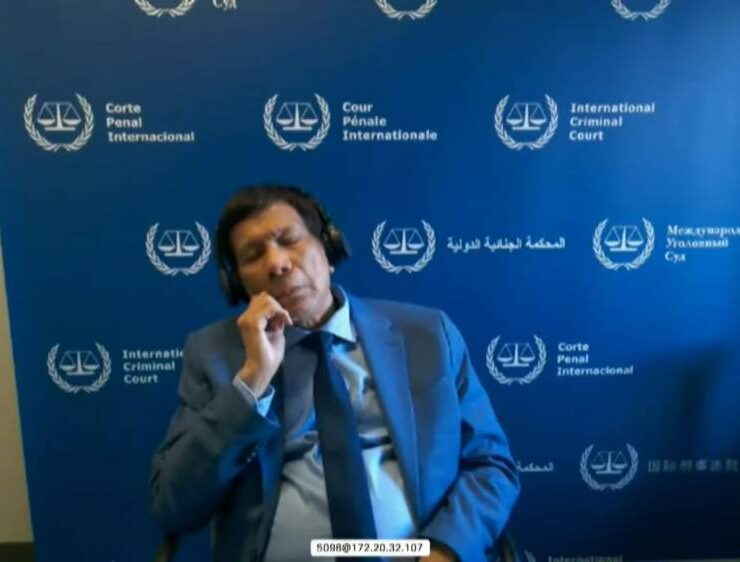Charter framer urges Senate: Follow process

All the Senate leadership has to do is to follow the process.
This was what retired Supreme Court Associate Justice Adolfo Azcuna, one of the framers of the 1987 Constitution, said over the weekend as more of the country’s legal minds intensified public pressure on the Senate to convene as an impeachment court and finally begin the trial of Vice President Sara Duterte.
“All [Senate President Francis “Chiz” Escudero] needs is to get the Articles [of impeachment] read to the Senate and served on the Respondent,” Azcuna said in a post on Facebook.
“As long as […] Escudero gets to start the process before the 19th Congress lapses on June 30 when the term of office of Representatives and outgoing Senators end, he will have done well,” he also said.
The Senate has yet to begin the impeachment process four months since the articles were transmitted by the House of Representatives.
Escudero initially scheduled the reading of the articles on June 2, but he postponed it to June 11, citing the need to tackle priority legislations of the current Congress.
Timetable
Senate Majority Leader Francis Tolentino presented a possible timetable that sees the upper chamber finishing the trial in 19 days.
“We need to convene because we will formally accept the Articles of Impeachment. Convening is part of the trial itself; it starts when you take an oath,” said Tolentino in an interview with radio dzBB on Sunday.
He added that the impeachment trial may be expedited and finished in 19 days, or June 30.
According to his draft trial calendar, which he has yet to present to the Senate, the impeachment court can be constituted on June 11, and the respondent will be given 10 days to submit response. The prosecutors may reply on June 22, followed by submission of trial brief and opening statement in the afternoon of June 23.
The prosecution may present evidence on June 24 to 25, while defense may do so on June 25 to 26.
If there is a need for rebuttal, the prosecution team may do it in the morning of June 27, while defense team may do it in the afternoon.
For oral arguments, one hour each will be given to prosecution and defense teams on June 28.
The senator judges will then have a closed-door meeting on June 29, and will render judgment on June 30.
The majority floor leader also said the prosecution can narrow down the seven Articles of Impeachment, just like in the impeachment of the late Chief Justice Renato Corona, where it was narrowed down from eight to three articles.
‘Agad-agad’
On the other hand, Azcuna disputed arguments that the articles of impeachment received by the 19th Congress cannot cross over to the next Congress. He explained that impeachment cases are “not a function” of the Senate’s legislative power, “but it is a Constituent power.”
Citing the Constitution, he pointed out that the impeachment proceedings are indicated under Article XI, which pertains to the accountability of public officers, and not under Article VI, or the legislative power of Congress.
“So it does not fall under the rule that unfinished business lapses with the outgoing Congress because the Constitution says the opposite—that the trial must ‘proceed’ meaning it must continue until it is finished,” he said.
“It cannot proceed if it is made to lapse. Since it must proceed, it follows that it does not lapse,” he added.
He also called attention to being the constitutional framer who drafted Article XI, including its Section 1, that states: “Public office is a public trust and that public officers and employees must at all times be accountable to the people.”
It was also Azcuna who put the word “forthwith,” a term that has long been pointed out to the Senate in proceeding with the impeachment.
He explained that the term “forthwith” referred to the need for the Senate to proceed to trial after the House has adopted one-third or more votes in impeaching an official.
“[It] precisely meant to mean immediately and without unreasonable delay or in the National language official version, ‘agad-agad,’” Azcuna said.
‘Grave violation’
The Philippine Bar Association (PBA), the country’s oldest voluntary national organization of lawyers, also referred to the Constitution, saying that its text is “clear, bears no ambiguity, and is as direct as it can be.”
“Let the trial be held as the Constitution commands. Require the prosecution to prove its case. And allow the respondent the chance to clear her name,” the PBA said in a statement on Saturday.
“Reasonable people can disagree on how fast ‘forthwith’ means but, it is safe to say it does not mean several months of delay,” it said.
Tensions in the Senate escalated last week after a draft resolution surfaced from the office of Sen. Ronald dela Rosa, a longtime ally of the Duterte family. The proposal urged senators to effectively dismiss the impeachment complaint against Duterte without a trial.
Azcuna warned that dismissing the articles of impeachment without proceeding to a trial would be a “grave violation of the Constitution.”
The dismissal, should it happen, can be reversed by the Supreme Court or by the Senate of the next Congress “on a proper motion for reconsideration,” he said.
“It is crucial [though] that someone against the dismissal must vote with the majority that votes to dismiss because only someone who voted with the majority can ask for reconsideration,” Azcuna said. “Someone who will remain as Senator in the 20th Congress.”
Incoming senators
A House prosecutor proposed that incoming senators act as observers when the Senate convenes as an impeachment court so they would be prepared to be judges in the 20th Congress.
In a statement on Sunday, Manila Rep. Joel Chua maintained that at noon of June 30, “the newly elected senators need only to take over from the senator-judges who are departing the Senate.”
“When the Senate convenes as an impeachment court, I recommend that the new senators be present in the chamber as observers so they can prepare for their imminent role as senator-judges,” said Chua, who is part of the 11-man prosecution team.
Deans of schools and colleges of law of Ateneo de Manila University, Xavier University-Ateneo de Cagayan, Ateneo de Davao University, Ateneo de Zamboanga University and Ateneo de Naga University have also added their voices to the growing call for the impeachment trial to proceed.
“As educators, we are called upon by our Ignatian foundation to educate men and women to embrace and build social, economic and political structures that will preserve our common humanity and our collective interest as Filipinos so as to foster the promotion of justice in the spirit of service and the pursuit of the greatest universal good,” read their statement.
The University of Santo Tomas posted a brief statement calling for “respect” for the Constitution and for senators to “fulfill the duty.”
“Forthwith proceed. Veritas,” read the statement by the oldest Catholic university in the country.
Adamson University said “This is a clear constitutional order to act immediately, and does not in any way imply that the Senate has discretionary powers in this regard. Thus, any delay or refusal to act undermines this express mandate and weakens the foundations of our democratic institutions.” —WITH REPORTS FROM TINA G. SANTOS, JANE BAUTISTA AND JEANNETTE I. ANDRADE





















